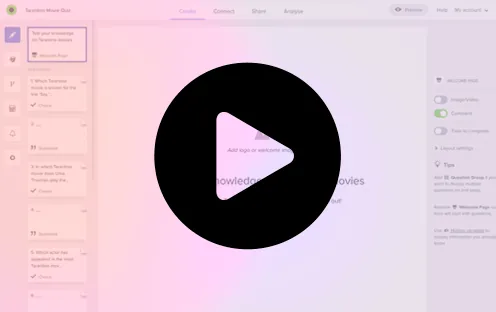
In the dynamic world of survey distribution, choosing the right channel can significantly impact your engagement and response rates. Two popular channels, WhatsApp vs. SMS, offer unique advantages and cater to different business needs.
At Responsly, we offer robust solutions for both SMS and WhatsApp as a survey distribution to meet diverse business needs. Selecting the appropriate communication channel should align with both your objectives and your audience’s preferences. Despite WhatsApp’s significant impact on SMS usage since its 2009 launch, SMS remains a steadfast and widely-used option. This blog will delve into the distinctions between WhatsApp and SMS from a business perspective, empowering you to make an informed choice for your survey distribution strategy.
WhatsApp vs. SMS: Overview
WhatsApp Business
WhatsApp ranks among the most widely used messaging platforms globally. It provides users with a cross-platform messaging service that functions on smartphones and relies on internet access to send and receive messages. The app can be accessed on any internet-enabled device, including desktops, laptops, tablets, and mobile phones. WhatsApp supports rich media, allowing users to share text, images, and videos with a character limit of 4096 per message.
Available in 60 languages and over 180 countries, WhatsApp enjoys significant global popularity, particularly in Europe. It boasts an 85% market penetration in the Netherlands, followed by Spain and Italy at 83%. WhatsApp consistently ranks among the top three messaging apps in many countries. Its popularity spans across generations, with Boomers (55+) and Gen X (45-54) naming it their preferred messaging app, and it remains a top choice for Millennials (25-44) and Gen Z (18-24).
Meta has developed the WhatsApp Business Platform with over 2 billion active users daily across all age groups to enable businesses to leverage this powerful messaging tool. The WhatsApp Business Platform can be accessed via API or software, depending on business requirements, with options for both On-Premise API and Cloud API.
SMS:
Short Message Service (SMS), a fundamental communication tool, has been around since the 1990s. Despite its age, SMS remains relevant with over 5 billion users globally. Its simplicity and ubiquity ensure that nearly any mobile phone can receive an SMS, making it a reliable business channel.
SMS for business leverages traditional text messaging to reach customers directly on their mobile devices. Businesses use SMS for alerts, reminders, marketing campaigns, and, of course, surveys. SMS is valued for its high open rates, simplicity, and broad reach, making it an effective tool for businesses looking to communicate quickly and efficiently.
WhatsApp vs. SMS: Engagement & Reach
Both WhatsApp and SMS facilitate two-way communication, but WhatsApp tends to be more conversational and interactive. While SMS can support two-way messaging, it is often used for one-way communication like updates, codes, or notifications.
WhatsApp offers a more personal and informal interaction, leading to higher engagement rates. Customers typically respond more quickly on WhatsApp, enhancing customer relationships, trust, satisfaction, and brand loyalty. However, not everyone uses WhatsApp or has reliable internet access, which may limit your reach. Conversely, SMS is a native app on nearly all mobile phones, making it a reliable way to reach a broad audience, including those without consistent internet access. However, there may be international restrictions based on your target audience.
Both platforms can handle large volumes of messages. WhatsApp fosters conversations, while SMS is ideal for disseminating bulk information. The best choice for your business depends on your specific goals and your audience’s preferences.
Opt-Ins
Before contacting customers on WhatsApp, you must comply with the national regulations of your target audience’s country and secure an opt-in from your customers. WhatsApp’s consent policy helps maintain the quality of its service. Depending on national regulations, SMS messages may also require opt-ins, but they are generally easier to send if you have your customer’s phone number.
WhatsApp and SMS: Security
When it comes to security and data protection, SMS has limited capabilities. Messages sent via SMS are generally not encrypted, which makes them potentially vulnerable to interception and unauthorized access. While the cellular network does offer some degree of security, SMS is not regarded as a highly secure messaging channel.
On the other hand, WhatsApp offers robust security features, including end-to-end encryption by default. This means messages are encrypted on the sender’s device and can only be decrypted by the recipient’s device. Additionally, WhatsApp supports two-factor authentication, further protecting user accounts from unauthorized access.
| Feature | SMS | |
|---|---|---|
| Rich Media Support | Yes (images, videos, voice messages) | Text and MMS |
| Interactive Elements | Yes (polls, clickable links, quick replies) | No |
| Audience Reach | Limited to users with smartphones and internet access | Broad reach, including users without smartphones with internet |
| Engagement Level | High (engaging features and multimedia) | Moderate (text-based, less interactive) |
| Ease of Use | User-friendly for tech-savvy audiences | Simple and straightforward for all users |
| Group Distribution | Effective (group chats and broadcast lists) | Limited (typically one-to-one) |
| Response Rates | Potentially higher due to engaging format | Can be high due to simplicity and ubiquity |
WhatsApp vs. SMS: Use Cases
Engagement and rich media:
- WhatsApp: Supports multimedia elements such as images, videos, and interactive buttons, which can make surveys more engaging and visually appealing. This can lead to higher completion rates and more detailed responses.
- SMS: Limited to text only, which might restrict the ability to include rich media or interactive features.
Reach and accessibility:
- WhatsApp: Requires an internet connection and the WhatsApp app to be installed, which might exclude users without access to these resources. However, it is highly accessible on various devices including smartphones, tablets, and computers.
- SMS: Universally accessible and does not require internet or specific apps, making it ideal for reaching a broad audience, including those in areas with limited internet connectivity. SMS messages are compatible with all mobile phones, including basic models.
Response rates and delivery:
- WhatsApp: Typically, messages sent through WhatsApp may have higher response rates due to the app’s interactive features and the ability to provide immediate feedback. However, delivery rates can be affected by users’ app settings and privacy controls.
- SMS: Often achieves high deliverability and open rates as SMS messages are less likely to be filtered or ignored. The straightforward nature of SMS can also lead to prompt responses, though the format may limit the depth of the survey.
User experience:
- WhatsApp: Offers a more engaging and user-friendly experience with options for quick replies, multimedia, and a more personalized interaction. It allows for real-time conversations and can handle more complex survey formats.
- SMS: Provides a simpler user experience, which can be advantageous for straightforward surveys but may result in less engagement for more detailed or interactive content. The text-only format can sometimes lead to lower engagement for more involved surveys.
WhatsApp and SMS: Pricing
WhatsApp:
- Costs can vary based on the number of messages sent and received, and additional features used. Generally, WhatsApp Business API pricing is competitive but can add up depending on usage.
SMS:
- Typically charges per message sent, with rates varying by region and carrier. While costs are usually low, they can increase with high-volume campaigns.
WhatsApp vs. SMS: Which one suits your business best?
The choice between WhatsApp and SMS for survey distribution depends on your target audience, budget, and specific use cases.
- Use WhatsApp if:
- Your audience is active on WhatsApp.
- You need to send rich media content.
- Security and encryption are top priorities.
- Use SMS if:
- You need to reach a broad audience, including those without smartphones with the internet.
- Simplicity and reliability are crucial.
- Cost-effectiveness is a primary concern.
When deciding between SMS and WhatsApp for survey distribution, it’s essential to consider your business needs, audience preferences, and the desired level of interactivity. SMS offers broad reach and reliability, functioning on nearly all mobile devices without needing an internet connection. Conversely, WhatsApp provides enhanced security, rich media support, and a conversational approach, making it perfect for engaging customers and building relationships. Ultimately, integrating both can maximize your reach and effectiveness, ensuring seamless communication regardless of your audience’s preferred platform.


